Introduction
These are the results of the paper based consultation exercise held during the 2017 National Forest School conference. A two hour drop in session was held over lunch on the Saturday. The flipcharts that were populated were then left up in the main meeting area for the remainder of the conference, where delegates could add to them. Something around 30 to 40 people responded. Not all people added content to all flipcharts.
The exercise was by no means comprehensive. It is just a start in what the FSA directors have agreed should be a wide scale consultation about and review of the Forest School principles. All FSA members will be invited to participate in surveys and there will be opportunities for members to join a working group responsible for this process.
Question 1: How long is the longest forest school programme that you deliver?
| Number of responses | Length of longest FS programme delivered |
| 8 | 2 years + |
| 10 | 1 year |
| 5 | 6 months |
| No one recorded a shorter programme |
Comments include …
- Needs to cover all seasons!
- 20 weeks x 2 years (SEN children – 7EBD and ASD) BUT also deliver FS taster programmes of 6 weeks to local school in its 4th
- All year every 2 weeks for 2 years.
- 6 weeks. (this was not recorded on the scale)
- 7 years but children grow and become helpers.
- Children get forest school from reception – year 6 every week all year, so six years in total.
- KS2 to sixth form.
- Ideally should carry on through children’s school life.
- Currently yearlong for some of cohort but some settings manage 1 per fortnight term time.
Question 2: How long should a forest School programme be – as a minimum?
| Number of responses | Weeks each year |
| 5 | 30+ weeks |
| 2 | 17 weeks |
| 10 | 12 weeks |
| 3 | 10 weeks |
| 3 | 6 weeks |
| 1 | 5 weeks |
Comments include …
- 36-52 weeks
- 36 weeks or bust.
- Problem with shorter sessions is that children don’t get to see/experience all the seasons.
- It should ideally carry on throughout the school.
- At least 6 weeks, ideally a whole school year.
- Ideally a full school year. In reality a term or less.
- ‘Long-term’ should be decided by the practitioner in consultation with their client group, their situation etc.
- MORE THAN ONCE!! Aiming to increase delivery over time. There is bound to be a difference between ideal and reality?!
- 6 weeks
Question 3: What is the minimum acceptable duration of a Forest School session?
| Number of responses | Minimum number of hours |
| 1 | 3 hours |
| 5 | 2.5 hours |
| 13 | 2 hours |
| 3 | 1.5 – 2 hours |
| 5 | 1 hour |
Comments …
- Actual activity time –MINIMUM 2 hours. Not getting dressed, walking to woods etc.
- 2 hours minimum. My 2.5 – 4 year olds super busy for 2.5 – 3 hours.
- Should travel and wellie donning time be included? Skills and experience can be developed but it is not in the forest.
- 5 hours including ‘walking’ to and from a site – we are active during journey.
- Logistically usually only acheive1.5 hours not including changing. Aim to achieve 2 hours. Weather can dictate.
- School afternoons can be short and schools reluctant to let children out of literacy and numeracy.
- 2 hours not long enough most of the time but cut shorter in winter for pre-schoolers.
- Always run out of time!
- Age dependent. Yes! Any ability.
- 5-2 hours is quite possible
- Some SEN children cannot cope with longer than 2 hours at the start of a programme
- I actually think that longer sessions will be better because even a 2 hour session doesn’t give children time to engage fully (to find their element!). Longer sessions mean that participants will be able to immerse themselves in self-directed play.
- ‘QUALITY’ of provision equally important as duration. Related to client and practitioner discussion.
- 5-2 hours minimum. Some schools can only do afternoons, which are shorter.
- Currently offer 2 hours (not enough). Age 3-4 start asking to go back after 1.5 hours. They sometimes find winter difficult.
- 1 hour although programme would need to be longer to achieve same outcomes
- 2 hours.
Question 4: Should the duration of a Forest School programme depend on the type of client group?
| Yes | 9 |
| No | 10 |
Comments …
- Eg older children have to re-learn how to self-direct. Some SEN/M-health issues or experience level mean people need more time to adjust to being in forest.
- Yes – depends on participants’ needs.
- SEN children / older children need longer programme for behaviour change and deep learning.
- EYFS short. KS1 up longer.
- Yes it should be tailored to the group but also retain the integrity of Forest School.
- Age/stage/ability appropriate.
- Depend on individual
- 2-3 year olds quite content 10-2pm in FS nursery
- programmes should be ‘long term’ for all ages, abilities, SEN etc. Someone else wrote AGREE!
- Depends on the evidence.
Question 5: Are 3 sessions per week for 4 weeks just as effective as 1 session per week for 12 weeks?
Comments …
- No, because they won’t experience all weathers and seasons or have enough reflection time. Someone else ticked this comment.
- It’s a different experience. Would make an interesting study.
- Any provision is far better than none. Someone else ticked this comment.
- Yes, they may not be seeing the seasons but the point is that they settle down and get used to being in the natural environment and become confident.
- Could be but outcomes would be different
- Some better than none but … not true FS – 6 principles.
- No – does not achieve long term results.
- It will be differently effective. There will be many positive impacts. Some outcomes, e.g. mental wellbeing, connection with nature etc. may be greater. Others, e.g. awareness of the seasonality will be lower. Someone else ticked this comment.
- Well, yes and no as, just like flowers children need time to grow.
- Depends on client group
- It will be effective in a different way.
- Have not done it so can’t assess difference.
- Probably effective (not delivered this) but not seasonal.
- Never tried it, but probably quite nice and more intensive.
- I was taught that you needed the week between to assimilate. Also, 12 weeks would be longer terms so better.
- Do you teach English or maths in 4 weeks?
- Needs to be consistent for a relatively long period of time.
- What’s the purpose timetabling would be interesting?
- Better than no FS. Is there time to reflect?
Question 6: What are the barriers to delivery of long term Forest School programmes? (schools/preschools/freelance)
Comments …
- Naughty providers perpetuating myths about the length of a Forest School programme.
- Staffing, money, volunteers
- Money, time, understanding of FS
- School staff negativity about cold weather
- School or parents don’t have funding
- Staffing and funding
- Need more time allocation for outdoors learning in the curriculum
- Funding and curriculum pressures and lack of creativity
- Time within school day
- Head, governors, local council, real understanding
- 2 classes per year group, 2 groups of 15 per class – the school year divides neatly into 9 week programmes of afternoon outdoor learning
- Schools not understanding FS properly and funding. Some schools still not interested in funding out more
- Tiny sites so too muddy in midwinter
- For me, none other than lack of ‘forest’. We have field and beach and a young trees
- Release time. For us teachers session time in our non-contact
- Lack of understanding amongst schools about the importance of ‘long term’.
- Pure numbers and time to commit. 1 x week 10 x fortnight 2 hours each session.
- Funding – for delivery and transport
- Reluctance to participate – adults, staff, children
- Finding sites nearby and helping schools develop their grounds
- Funding and transport costs and curriculum time
- Children not being able to leave their ‘proper learning’ in the mornings because of literacy and numeracy
- School funding and staffing ; understanding of what FS is and how it differs from other outdoors learning
- Stopping in winter because children don’t have suitable clothing and school can’t afford it.
- Funding, location, management, time. UNDERSTANDING AND AWARENESS OF FS BY MANAGERS
- Pressure on schools to report that high numbers of children have accessed FS
- Schools wanting whole class. Anything from 17 – 25 at once
- Pressure of school targets
- Funding
- I can only do 6 week as working in schools I need to fit in with term times. I can do four year groups in this time.
- Teachers want lots of children to experience it so les time each
- Money!!
- Teachers (FS leaders) needed elsewhere. Too many needs!
- Money!
- Number of children wishing to participate (fitting everyone in).
Question 7: Ideas for overcoming barriers to delivery of long term Forest school programmes.
Comments …
- Flexibility, info and more support
- Protest united argument
- Evaluation long and short term effects
- Marketing REAL FS to schools, education authorities, parents, press etc
- Value individual needs and interests
- More trained FS leaders and more space could then run more than 1 at a time
- More networking events throughout the year
- Higher profile link with mental health charities / initiatives (as high profile at the moment)
- Spread the word campaign. Management, time, money.
- Whole staff training . Whole school on board.
- Be flexible
- Basic FS training to be including in all teacher training courses. AGREE!
- Ofsted recognition and support
- Link with child in mind. Emphasis on preventative mental health
- New FSA provider recognition. Heads love a logo on website and letterhead.
- Funding, awareness, recognition, grants
- Research papers recognised at government level
- Large collaborative funding applications
- Ofsted inspectors trained in FS
- Increase profile of FSA
- Publicity – public opinion about FS is.
- Before taking on FS it is good to support school/preschool staff’s understanding by providing training about its ethos.
- More publicity for FS so more people know about it and ask for it.
- Funding!
- Inclusion in curriculum
- National recognition of FSA and practitioners outside FS world.
- Mental wellbeing benefits research
- Local profile raising – engage with LEAs, Head teachers, managers, teachers
- Overhaul of whole education system – one that is run by educators
- Inclusion in the curriculum; clear and effective communication with decision makers – Heads, governors and funders.
Question 8: Who and how are your Forest School programmes funded?
Comments …
- Previously parents paid. Now the setting (early years) includes it as provision (as their selling point)
- Very lucky, employed by county council in a school.
- School
- Parents, nursery, some local council funding
- Funding from grants
- Self funded by making crafts i.e. reindeer / snowmen and selling them at a Christmas feyer
- Self funded – reliant on donations .. cash, resources and time
- Parents, childminder
- Self funded, summer school, Forest School yogo and mindfulness
- Parents and careers.
- By schools
- School
- Parents, school
- SEN, school pay directly for programme. 2. School via parents contribution and PP money – pay directly for programme. 3. HLF funded project pays for wild beacon delivery.
- Parents, childminders
- Schools, private clients
- Parents / childminders
- Parents and school
- Schools paying £220 per day
- We run a club in school holidays that provides us with budget. £40 per day 9-3 20 kids
- Parents – £6 per 2 hour session with parents
- Set a CIC so that we can apply for small pots of funding. Although have to spend time writing bids L
- Parents and school
- School (special school)
- 1, me grant writing applications. 2, school – pupil equality fund
- Local council funding family learning (originally funded as adult skills budget)
- By parents. But is is delivered IN the school day J
- School directly, council, parents (HE groups)
- Short breaks (funded LA) , also privately paid, also work with individual schools
- Parents and schools.
Additionally, conference delegates were given feedback forms that included 32 relevant questions. These are presented below.
5) a) What is an aceptible minimum number of weeks for a FS programme: – of the delegates that replied to this question, some have responded with more than one option so put them in more than 1 category
- Less than 6 weeks = 1
- 6 weeks = 5
- 8 weeks = 2
- 10 weeks = 2
- 12 weeks = 6
- 12 weeks then once a fortnight
- 17 to 20 = 2
- 24 weeks = 1
- 25 – 33 = 1
- Whole school year = 5
5) b) How often should th sessions take place:
- Weekly: 15
- Fortnightly: 8
- Every 3 weeks: 1
- Regularly throughout the year: 1
5) c) Minimum duration in hours:
- 1 hour = 4
- 1.5 hours = 6
- 2 hours = 18
- Half a day = 1
- Full day = 2

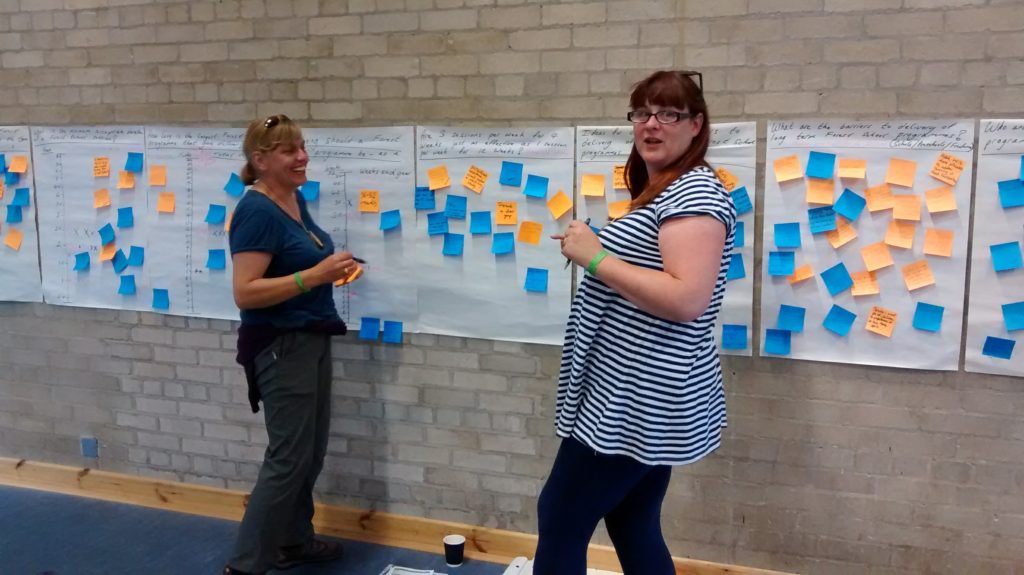
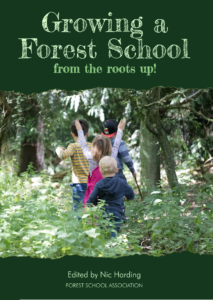
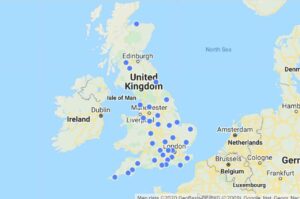
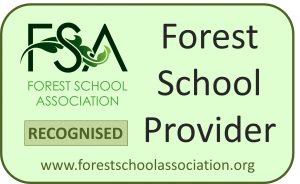
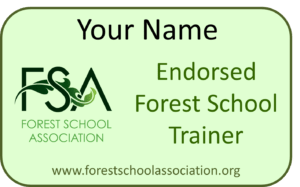
Is it possible to determine the percentage of responders who were trainers, who qualified and who not? Probably at a conference level. It would be interested get to then compare that with responders to a wider consultation, to see whether length and depth of practise affects the perception of the practitioners. Presupposing that length and depth equate to greater understanding!
Difficult to do that retrospectively as we don’t have the data on conference delegates.. or who participated in the process. I think that we can try and build that in to the survey that goes to all members. It would definitely be useful to be able to correlate the findings in that way. I will make sure that the working group consider this. Of course, we are yet to put out a call for working group members. Interested Sara? Would be could to have people involved with experience of social surveys.
Yes, I would be happy to get stuck in.
Good work; interesting results; looking forward to the wider consultation.